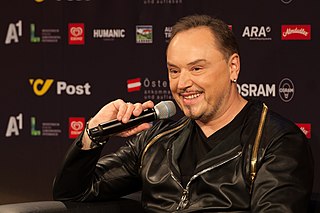Slaven is a masculine Slavic given name. Cognates include Slavko. Czech feminine form is Slavena.
Notable people with the name include:
Zoran is a common South Slavic name, the masculine form of Zora, which means dawn, daybreak. The name is especially common in Serbia, North Macedonia, Croatia and to some degree in Slovenia.
Radić is a common South Slavic surname.
Đurić is a surname found in Croatia, Bosnia and Serbia, a patronymic derived from the male given name Đuro or Đura. Notable people with the surname include:
Martinović is a patronymic surname meaning 'son of Martin', and is a common surname in Bosnia and Herzegovina, Croatia, Montenegro and Serbia. Its Hungarian form is Martinovics.

Nenad is a male personal name of Slavic origin common in countries that speak Slavic languages. It is more widespread in Bosnia and Herzegovina, Slovenia, Croatia, Serbia, and North Macedonia than in other countries. The name is derived from the word nenadan, which means "unexpected". It was introduced to North Macedonia via Serbian and is now a fairly popular name.
Mandić is a Serbo-Croatian surname, a matronymic of the feminine given name Manda, a hypocorism of Mandalena, a variant of Magdalena imported from Italian.
Branko is a South Slavic male given name found in all of the former Yugoslavia. It is related to the names Branimir and Branislav, and the female equivalent is Branka.
Filipović is a patronymic formed out of the name Filip and the suffix -ić. It is a common surname in South Slavic languages. It's cognate to Bulgarian Filipov or Polish Filipowicz.
Mladen is a South Slavic masculine given name, derived from the Slavic root mlad, meaning "young". It is present in Bosnian, Slovenian, Montenegrin, Macedonian, Bulgarian, Serbian, and Croatian society since the Middle Ages.
Duško is a Slavic masculine given name, often a diminutive for Dušan.
Dragan is a popular South Slavic masculine given name derived from the common Slavic element drag meaning "dear, beloved". The feminine form is Dragana.
Dragičević is a South Slavic surname. Notable people with the surname include:
Radulović, Radulovich is a Serbo-Croatian surname, derived from the male given name Radul or Radule. Notable people with the surname include:
Tomašević, Tomasevic or Tomasevich is a Slavic patronymic surname, equivalent to Thomson or Thompson. Notable people with the surname include:
Vuković is a common family name found in Bosnia and Herzegovina, Croatia, Montenegro, and Serbia, of which bearers are either Bosniaks, Croats, Montenegrins or Serbs, as well as medieval families long before idea of national identity ever appeared.
Vukašinović is a Bosnian, Croat, Montenegrin and Serb surname derived from a masculine given name Vukašin. Notable people with the surname include:
Ilija is a South Slavic male given name, cognate of Ilya/Elijah.
Bilić is a Croatian, Serbian and Bosnian surname.
Stanišić is a surname found among Serbs, Montenegrins and Croats.
Đurković is a surname of Serbo-Croatian language origin. Notable people with the surname include: